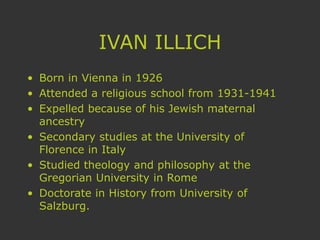The document provides biographical information about Ivan Illich, an Austrian philosopher and critic of modern institutions including schools and medicine. It summarizes some of Illich's key ideas from his book "Deschooling Society" including his arguments against compulsory schooling and myths about the value of institutionalized education. Illich advocated for "learning webs" as an alternative that would give individuals more control over their own learning through peer-to-peer sharing and access to educational resources.













![Schooling—the production of knowledge, the marketing of knowledge, which
is what the school amounts to—draws society into the trap of thinking that
knowledge is hygienic, pure, respectable, deodorized, produced by human
heads and amassed in a stock. I see no difference between rich and poor
countries in the development of these attitudes to knowledge. There is a
difference of degree, of course; but I find it much more interesting to
analyze the hidden impact of the school structure on a society; and I see
that this impact is equal or, to be more precise, tends to be equal. It doesn’t
matter what the overt structure of the curriculum is, whether the school is
public, whether it exists in a State that has the monopoly of public schools,
or in a State where private schools are tolerated or even encouraged. It is
the same in rich as in poor countries, and might be described as follows: if
this ritual that I consider schooling to be is defined by a society as education
[...] then the members of that society, by making schooling compulsory, are
schooled to believe that the self-taught individual is to be discriminated
against; that learning and the growth of cognitive capacity, require a
process of consumption of services presented in an industrial, a planned, a
professional form;[...] that learning is a thing rather than an activity. A thing
that can be amassed and measured, the possession of which is a measure of
the productivity of the individual within the society. That is, of his social
value [...]](https://image.slidesharecdn.com/3885110-240116090315-36e6d67d/85/Ivan-Illich-mit-media-lab-3885110-ppt-14-320.jpg)



![A convivial society would be the result of social
arrangements that guarantee for each member the most
ample and free access to the tools of the community and
limit this freedom only in favor of another member's equal
freedom.
In every society there are two ways of achieving specific
ends, such as locomotion, communication among people,
health, learning. One I call autonomous, the other
heteronomous. In the autonomous mode I move myself. In
the heteronomous mode I am strapped into a seat and
carried. In the autonomous mode I heal myself, and you
help me in my paralysis, and I help you in your
childbearing [...]In every society and in every sector, the
efficiency with which the goal of the sector is achieved
depends on an interaction between the autonomous and
the heteronomous modes.](https://image.slidesharecdn.com/3885110-240116090315-36e6d67d/85/Ivan-Illich-mit-media-lab-3885110-ppt-18-320.jpg)


